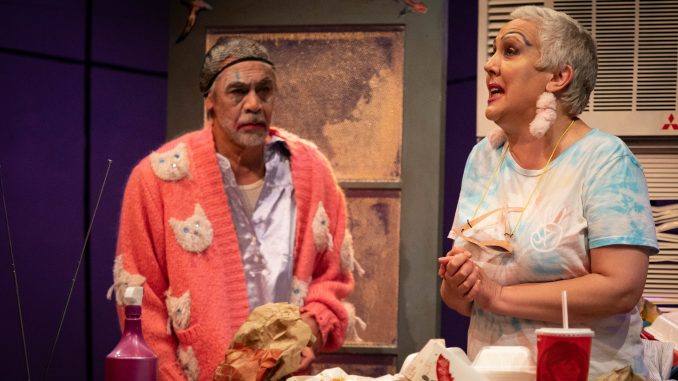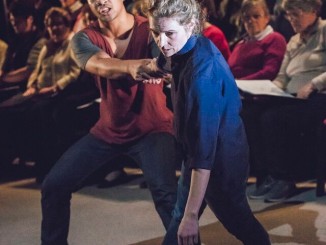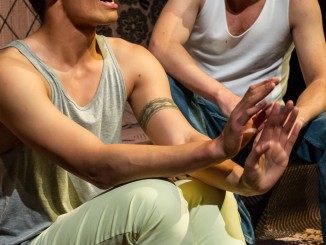
[Transitory Spaces]
When prodigal son Isaac (Arlo Green) returns from Afghanistan to find his family home turned upside down, he’s rightfully shocked. Having spent his last three years in the Marines’ Mortuary Affairs division, and dishonourably discharged, it’s no surprise he longs for something familiar and recognisable. Mommy Paige (Rima Te Wiata) has done away with all the rituals and traditions the family once held tightly, and rebuilt it with the sheer ferocity of her new progressive ideas. Isaac’s father (Nathaniel Lees) is a shell of his former self, debilitated by a violent stroke. And his sister, Max (Adam Rohe), is no longer his sister, having discovered their genderqueer self and is now taking hormones.
A homecoming story in the great tradition of American plays, Taylor Mac’s Hir (which doubles as a gender neutral pronoun) carves a world in transition, filled with characters who are living in agitated flux – a microcosm for the broader, cultural transition occurring in the western world.
Like walking into an episode of Hoarders, the show’s opening tableau perfectly demonstrates this disarray. John Verryt’s set design provides the grungy remains of a broken home covered in a swamp of clothing, accompanied with Sean Lynch’s exposing lighting that doesn’t shy away from any of the ugliness.
The “absurd realism” that Mac describes the play with is a tricky beast, juggling style and tone from influences as far reaching as John Waters to Sam Shepard. The resulting product is along the lines of Bojack Horseman, an outlandish premise that requires serious engagement and respects its own truth.
The first half of the play is the trickiest, juggling dense exposition with long passages of ideological expression. But, for a play so dangerously didactic with its speechifying, Mac laces the script with frequently toxic laughs. Dialogue conveying the extremity of queer radicalism are the most potentially problematic, painting characters with opinions and ideas that seem like nightmare fuel for conservatives, straw men rather than real people. The jokes risk being laughed at rather than laughed with, but director Sophie Roberts treats these moments with a self-awareness and sincerity. These characters aren’t reduced to mouthpieces spouting beliefs. No, it’s more complicated than that – their beliefs are all they have left. But, amongst the torrent of dialectics, I occasionally ache to feel something more.
Juggling this tone the best is Te Wiata, unrecognisable as the family matriarch with her cropped blonde hair and the high-nasality of Fran Drescher. If it is a dangerously nasty embodiment of female rage, it’s also rooted in a deep empathy. While Mac doesn’t paint a very clear picture of what Paige once was like, the glee she takes in her transformation is palpable and, at times, contagious. You can practically see the snypases go off in her head, each thought being digested in real time. This is a powerhouse performance that demands to be seen.
Rohe plays teenage petulance well, snarky and sardonic in equal measure. What rescues the potentially cardboard cutout of social justice warriorism, with talks of queer, hippie communes and revisionist hirstory, is the willingness to engage with the character’s insecurities and playfulness, never forgetting the struggles and growing pains of adolescence. Lees has a similarly difficult role, asked simply to be a punching bag for the family’s pent up rage. As a once abusive husband and father, we can understand why the tables have turned, but it’s not pleasant viewing and his victimisation often twists the audience’s sympathies.
While Green is given little other than to react at the beginning of the play as the shell-shocked son, his character undergoes a devastating journey, one that reveals the complicated and knotty heart at the center of our contemporary age. How do you save someone who doesn’t want to be saved? In the second half he rises to the challenge of driving the play’s action, gleefully resisting and revolting against a system he can’t agree with. And we can see that the apple doesn’t fall far from the tree; both from his father’s masculine proclivities and his mother’s sense of defiance.
The rest of the play deals with the fallout from this world, when sanctuary is violated and ideologies butt heads against each other. It’s a violent, defiant and invigorating turn, fuelled by the crux of drama: conflict. And, to my surprise, it moves and even shocks with its tragic inevitability. In this battle between tradition and revolution we see that there are no easy victories, or winners who come out unscathed, suggesting that the price for this brave new world does not come cheap and sacrifices must be made.
This is a play for today, perfectly capturing the zeitgeist and reflecting the current paradigm shift in our still-evolving identity politics. What it lacks in subtlety it more than makes up for in urgency. A blistering portrait of the nuclear family blown to pieces.
Hir is presented by Silo Theatre and plays at the Herald Theatre until 25 August.




Leave a Reply